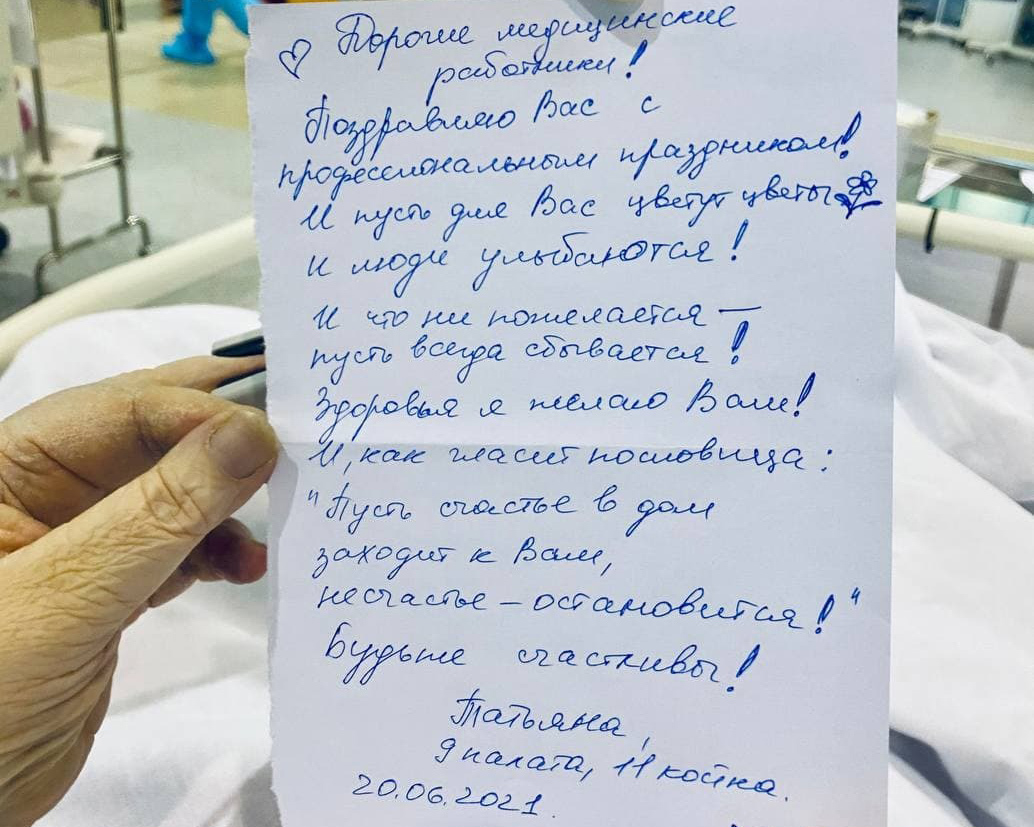In Moscow, the recruitment of Orthodox volunteers has begun in the "red zone" of covid hospitals.
To become a volunteer in the "red zone", you need to fill out a questionnaire on the website Miloserdie.ru, take preparatory courses organized by the Training Center of the St. Alexis Hospital and the Diocesan Commission on Hospital Ministry in Moscow, and then - an interview with the head of the Synodal Department for Charity and Social Ministry of the Bishop.
Oleg and Svetlana are volunteers in the "red zone" at VDNKh.
Oleg is 40 years old, he has four children, he has been working as a volunteer since March.
Svetlana is a candidate of legal sciences, a teacher, she has an adult son.
She became a volunteer in the "red zone" quite recently, about a month ago.
The standard shift for volunteers who represent the church service always starts the same way: at the entrance to the territory, they are met by guards and checked against the lists.
There is also a check at the entrance: each volunteer has his own individual pass in the form of an electronic card, it is also necessary to pass the control with thermal sensors.
If the temperature is normal, then the volunteers descend, pick up a changeable uniform and return upstairs.
In front of the "red zone" there is a room where you can change.
“Outside” you are allowed to take only your phone and a pass.
© Photo from personal archive
In the airlock area, volunteers are registered and allowed to enter the “red zone”.
Usually it is divided into a huge therapy room and half the size of the intensive care unit.
“When I went to the intensive care unit for the first time, I realized how difficult it is for people to be there, because the light never turns off, the wards themselves are gray, there are no clocks and devices that create a sound background are constantly working.
All this, of course, puts pressure on people, ”Svetlana shares her feelings.
“I remember the eyes of people.
They contain pain, despair, doom, or something.
Someone is lying completely naked.
People have no means of communication.
Imagine - you are deprived of everything at once.
There is only a ceiling above you, from which pipes stick out so that there is air circulation.
And that's all, ”adds Oleg.
The responsibilities of volunteers are very diverse: feeding people, changing clothes, someone needs to be washed, helping to change body position, cutting nails or combing hair.
And sometimes - just talk or hold your hand.
Volunteers note that most often people remember their lives, relatives and friends, ask to give them something or call.
“The strongest impression on me is made by the cases when families come to the hospital.
Just recently, a husband and wife got into: she was in therapy, and he was in intensive care.
The man asked me: “Please find my wife and give her three words.
That I love her. "
And I found her. He came up and asked if it was she. He said that my husband was in intensive care and conveyed his words. And she was so happy! Eyes lit up, asked to send back what awaits him. During the conversation, my daughter called and said that she had phoned the attending physician. A few days later, both of them were discharged, ”says Oleg.
There are other touching cases as well.
So, on the day of a medical worker, a woman who was in intensive care dictated to the volunteers a congratulation verse for all doctors.
“She is a teacher of the Russian language and literature, although she no longer teaches.
It was important for her to congratulate the doctors.
It was hard for her to speak, she spoke in a whisper.
She raised her hand, we went up.
She asked me to write it down and said it was very important.
And she began to dictate congratulations with verses, which she herself composed.
We printed them on thick paper, took a copy to the author too.
She is still in intensive care, ”says volunteer coordinator Elina.
© Photo from personal archive
Death in the "red zone" is often seen.
Volunteers note that it happens that in one of their shift a person is alive, and in the next - no longer.
“She was an elderly grandmother, Alla.
I looked after her, she always said in the process of communication that it was important for her to call her daughter.
And I realized at some point that she just really needs to make this call.
I organized it, ”Elina recalls.
According to the volunteer, the woman talked to her daughter, she was glad, she was in a wonderful mood.
“And on the next shift, I see that where she was lying, they turn off the devices.
I thought she was being transferred to therapy.
Taking a few steps forward, I realized that she was not transferred, but she died.
And at that moment I realized how important this call was.
I thanked God in my mind for being able to give my grandmother the opportunity at the last moment to talk to an important person for her, ”says Elina.
It is especially important to remember that you may be the last person to talk to, and every word you say will have a special meaning, Svetlana adds: “During my last shift, for example, I held a person's hand and told him not to give up , breathed and fought. You cannot say “everything will be fine”. Everything will be as it will be. But we are trying. A person feels when they are talking to him. It even happens that the indicators level out. "

